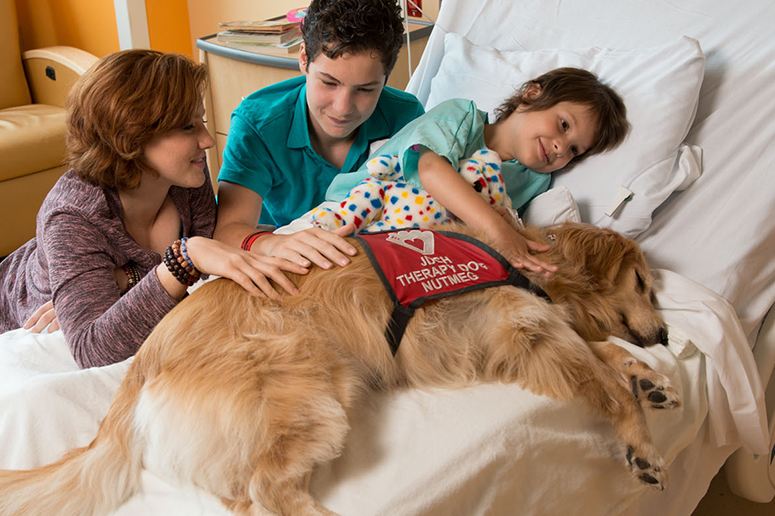Pediatric PM&R Services - Conditions We Treat
The physical medicine and rehabilitation (PM&R) team at Joe DiMaggio Children’s Hospital provides compassionate care for conditions that affect your child’s brain, spinal cord, limbs, muscles, and nerves. We offer expert diagnosis, treatment, and follow-up for a wide range of conditions resulting from illness, injury, or chronic disabilities.
PM&R helps patients with neurological conditions affecting the brain, spinal cord, muscles, and nerves. Call us to schedule a consultation:
954-265-4000Our experts treat the following conditions:
A brachial plexus injury affects the nerves that transmit signals from the spine to the arm, shoulder and hand. Symptoms include loss of muscle control, a limp or paralyzed arm, and lack of feeling in the hand or arm. Tumors, inflammation or shoulder trauma can cause brachial plexus injuries.
Cerebral palsy is a group of health disorders that affect balance, posture and movement. The condition occurs when the brain doesn’t develop normally or is injured before, during or after birth. Cerebral palsy may cause abnormal muscle tone and developmental delays. It can be treated using aquatic therapy or occupational therapy.
Chronic pain causes a wide range of discomfort, including stinging, burning, or aches and pains that last for an extended period. Injury, infection or ongoing illness such as cancer, arthritis or fibromyalgia may cause chronic pain. In some cases, there is no known reason for chronic pain. We offer advanced pain management therapies to help treat chronic pain.
Feeding disorders occur when a child refuses to eat or limits eating due to extreme food selectivity. They may also take a long time to eat and spit up or gag while eating. Children can base this selectivity on numerous factors such as texture, color or shape. Feeding disorders may cause weight loss, failure to thrive, developmental delays and chronic health issues. We provide feeding therapy for children with feeding disorders.
Muscular dystrophy is a genetic condition that causes muscle loss and weakness. Several types of muscular dystrophy exist, but all forms worsen over time as the muscles lose function and strength. Children with muscular dystrophy may have difficulty walking or climbing stairs. They may trip or fall excessively and experience pain in their leg, arm or face muscles.
A brain or spine tumor is a mass of cells that grows and divides abnormally in the tissues inside the spinal cord or brain. They may be tumors that originate in the brain, or they may have started somewhere else in the body and moved to the brain (metastatic tumors). Symptoms vary according to the tumor's type, location, and size but may include headaches, nausea, weakness, mood changes, and fuzzy thinking.
Orthopedic and musculoskeletal disorders affect the nerves, tendons, joints, muscles, cartilage and spine. They can lead to several conditions, including tendonitis, osteoarthritis, rheumatoid arthritis and fibromyalgia. In addition, disorders of the muscles, bones and joints may cause pain, interrupted sleep, aching, stiffness and fatigue.
Babies born before 37 completed weeks of gestation (more than three weeks before their due date) are considered premature. Labor that begins before 37 weeks is called preterm labor. Premature infants have less time to develop in the womb making their organs more vulnerable to weakness and illness. We help premature infants with our rehabilitation and therapy programs.
Spasticity causes rigid or stiff muscles. It occurs when the portion of the brain that controls movement or nerves is damaged. In these cases, signals from the brain to the spinal cord are interrupted. Spasticity may affect speech or lead to abnormal posture, physical disabilities and repetitive motions.
Spina bifida occurs when a baby’s spinal column does not close completely before birth, leaving a portion of the spinal column exposed. Spina bifida damages the exposed spinal cord and nerves. It may cause mobility issues, learning difficulties, and urinary or bowel problems.
The spinal cord carries signals between your brain and body through a bundle of nerves located down the center of your back. A spinal cord injury disrupts that process and prevents the signals from successfully transmitting. Spinal cord injuries may be complete and prevent all movement below the injury or incomplete with some movement and sensation.
Neuromuscular disorders, such as spinal muscular atrophy, affect the nerves that control the body’s muscles and interrupt the communication between the muscles and nerves. As a result, they may cause muscle weakness and withering that limits mobility and movement. Symptoms of neuromuscular disorders include spasms, pain and twitching.
Traumatic brain injuries occur when a sudden injury damages the brain. A concussion is a type of traumatic brain injury. For example, a bump or blow to the head or an object penetrating the skull can cause a traumatic brain injury. Traumatic brain injuries cause a wide range of symptoms, including headaches, confusion, behavioral changes, and reduced ability to concentrate or think clearly. TBIs are typically treated using a combination of therapies, including occupational therapy, physical therapy, speech therapy, vision therapy and vestibular rehabilitation.
Get Started
Treatments and ServicesPM&R helps patients with neurological conditions affecting the brain, spinal cord, muscles, and nerves. Call us to schedule a consultation:
954-265-4000It matters to you. It matters to us.
Joe DiMaggio Children's Hospital Quality and Safety
See our hospital's patient satisfaction numbers, number of patients and more.
View Quality and SafetyYou have a Right to Know About Prices
We want to give you the information you need to make important healthcare decisions, including the costs of our services.
View PricingMyChart Portal
View test results, schedule follow-up appointments, request prescription refills and more.
Login or Sign-up to MyChart
Helping Kids Be Kids, Even in the Hospital
From therapeutic play and music to pet visits and creative activities, our Child Life specialists support your child’s emotional well-being and help make the hospital experience more positive for the whole family.



